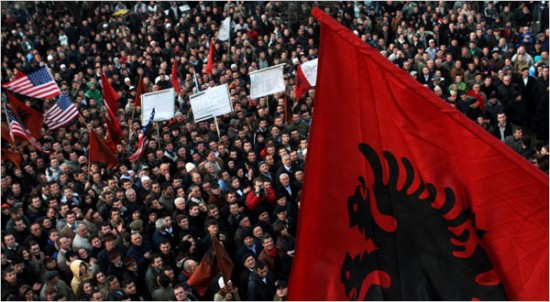Kosovo Today, Karabakh Tomorrow?
By Tamar Shahabian
February 2008 was an important month in both the Balkans and the Caucasus. On February 17, Kosovo officially declared its independence from Serbia. Two days later, overshadowed by that news, Armenia held its presidential election, which was followed almost immediately by mass protests, street violence, political arrests and a nationally-declared state of emergency.
Kosovo’s self-proclaimed independence has also incited its fair share of dramatic turmoil. Serbs throughout the Balkan region are angry and humiliated; and at the time of this writing, fewer than 30 countries out of 192 member states of the UN have formally recognized Kosovo’s declaration – hardly a majority. Serbia, Russia and a handful of European countries have been outspoken about their belief that recognizing Kosovo’s unilateral declaration of independence is tantamount to trouncing the international laws that govern matters of state sovereignty. They are worried about their own unhappy minorities getting ideas or gaining momentum for separatist quests. There has been much talk about whether a ‘Kosovo precedent’ has been created and what implications that might have for self-determination movements the world over.
They are right to worry. The manner in which Kosovo became a state was a historical event and historical events set precedents, period. Moreover, secessionist states such as Nagorno-Karabakh, Abkhazia, Palestine, Somaliland, and Western Sahara have much more in common with Kosovo than the US or UN want us to believe. Like Kosovar Albanians, citizens of many aspiring states have suffered discrimination, pograms and ethnic cleansing at the hands of their ‘parent states.’ They have responded by taking political measures to separate themselves from those national leaderships that failed to protect or include them; they have built democratic institutions of their own; and, over time, they have become functioning entities. After so many years of self-rule, it is not only unjust, but unrealistic to expect them to re-integrate into the states which forced their separation in the first place.
To be sure, the sheer amount of resources and attention that has been devoted to Kosovo by the international community cannot be rivalled by the other aspiring states; in this sense, Kosovo is unique. No other comparable movements have received the extent of military, economic or political support enjoyed by the Kosovars. Political circumstances have been the determining factor in which self-determination movements become valid in the eyes of the international community. But the way external actors regard Kosovo is not the only thing that matters. The internal drive and passion of the Kosovar Albanians to be free to govern themselves and exercise the same right of self-determination that all ‘peoples’ are entitled to is the same drive and passion which motivates other such movements.
Indeed, the Albanians of Kosovo and the Armenians of Karabakh base their statehood aspirations on the same principle: the right of self-determination, which was first enshrined by the UN Charter in 1945 and reinforced in subsequent texts which still form the basis of international law on the issue of national territory. The fact that Kosovo’s plight has received unequivocally more attention than Karabakh’s does not change the fact that both movements are legitimate for the same reasons.
Still, the outcomes have played out differently as Kosovo has now achieved its goal of independence – to the credit of the US, most of Western Europe, and the UN rather than Priština, necessarily. In other words, Kosovo’s self-proclaimed independence would not have mattered so much to anyone but the Serbs if it were not for the acceptance of that proclamation by other countries, including the world powers (with the notable exceptions of Russia and China). To use the words of New School University professor, Anna DiLellio, independence is not so much declared as recognized – meaning that a claim of independence is not legitimate unless or until others confirm the legitimacy of the claim.
Armenians are well aware of this political realism; Karabakh made its own declaration of independence in 1991 but still no country in the world has recognized it as a sovereign state. So how real is the claim? Isn’t the essence of self-determination that peoples should be the determinants of their own fate? Why should the rest of the world disregard their voices? Why should we force them to be part of a state they want nothing to do with? Whose right is it to say that they, the very people inhabiting the land, should not have the final say in how that land is governed? Is that not what democracy means at its core?
Yes, it is, but only in principle. In the real world, states will choose whether to recognize Kosovo based on political considerations such as their own domestic state of affairs, positions of their allies, and economic matters. Nations will not base their policy towards Kosovo on principle, or even really consider whether the Albanians there have a just claim to independence. We live in a state-centric system; by definition, it is in the national interest of countries to discourage and dismantle self-determination movements since they threaten to change the lines on the world map from which states derive their authority.
Thus, the outcome of the Kosovo situation is the exception and not the rule. In principle, it is a precedent, but in practice, it may be an anomaly.
So what then is the relevance of Kosovo to Karabakh? My only answer is this: the exceptional international attention that has been and will continue to be devoted to Kosovo’s independence may be able to serve as a starting point for launching a more widespread dialogue on the issue of national self-determination. If nothing else, perhaps the simple fact that a decisive outcome to the Kosovo situation has finally been reached will give hope to other peoples in similar situations that the deadlock need not last forever.



Leave a Reply
Want to join the discussion?Feel free to contribute!